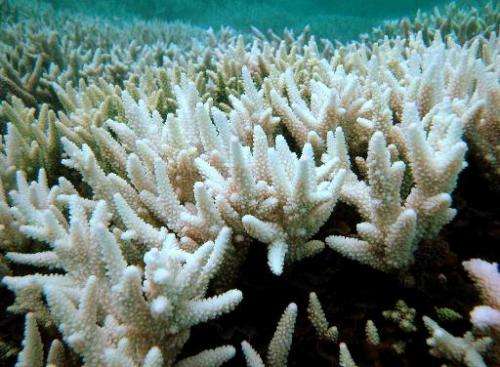This undated file photo released by the Great Barrier Reef Marine Park Authority on April 23, 2009 shows a bleached section of Australia's Great Barrier Reef
Australia gave the green light to a major coal port expansion for India's Adani Group on the Great Barrier Reef coast Tuesday under what were described as some of the nation's strictest-ever environmental conditions.
But conservation groups condemned the move, despite government reassurances.
Environment Minister Greg Hunt said he had placed 95 restrictions on the deep-water Abbot Point development in northern Queensland state, including a limitation on seabed dredging to three million cubic metres instead of the 38 million sought.
"As federal environment minister, one of my key responsibilities is to ensure ecologically sustainable development and maintaining the health of the Great Barrier Reef," Hunt said in a statement announcing the approval.
"Some of the strictest conditions in Australian history have been placed on these projects to ensure that any impacts are avoided, mitigated or offset."
But the approval was criticised by environment campaigners, with the Greens party accusing the conservative government of being in "climate denial".
"(Prime Minister) Tony Abbott and Greg Hunt risk the Great Barrier Reef being listed as World Heritage in danger. Blow for reef, tourism and jobs," Greens leader Christine Milne tweeted.
Adani's proposed expansion at Abbot Point will lift the port's export capacity by 70 percent, despite easing demand as China slows and extra supply comes online, driving the price of coal down by some 20 percent since 2010.
The conditions require that sediment entering the Barrier Reef marine park be reduced by 150 percent over the long term—a "net benefit" to water quality—and that Aus$89 million ($81 million) be contributed to reef conservation programmes and specific measures observed to protect marine flora and fauna, Hunt said.
Separately, Hunt said he had approved a major liquefied natural gas plant and transmission pipeline at Curtis Island, which is also within the reef marine park, for Australia's Arrow Energy under 53 environmental conditions.
He stressed that reef health was key to his considerations, with Canberra on notice from UNESCO that a world heritage downgrade could be on the cards next year without action to limit rampant coastal and resources development.
"It is important to note that each of these sites is already heavily industrialised and that the (approval) processes were highly advanced at the change of government (in September)," Hunt said.
"The conditions I have put in place for these projects will result in an improvement in water quality and strengthen the Australian government's approach to meeting the challenges confronting the reef into the future."
© 2013 AFP
























